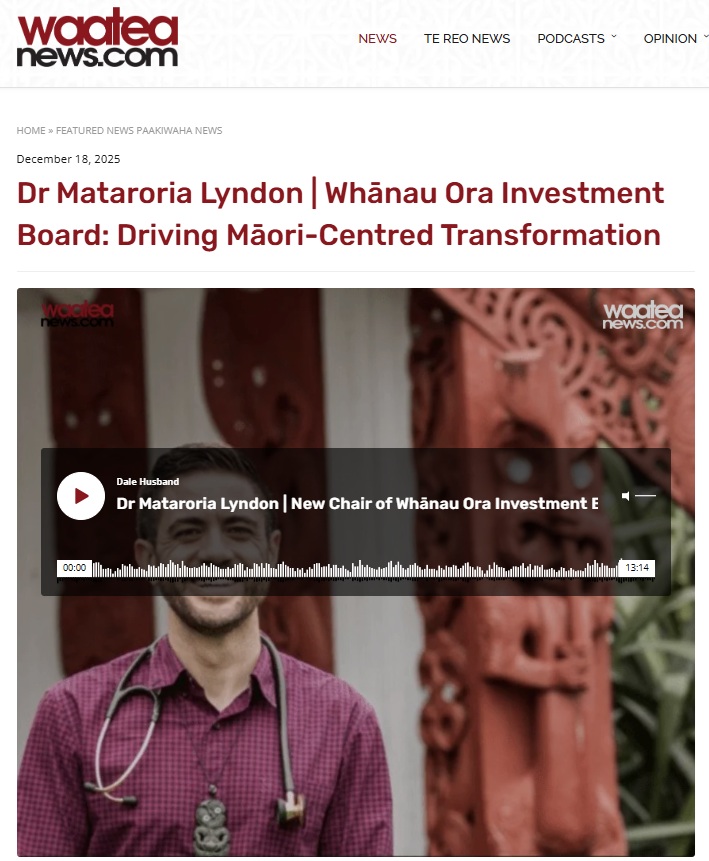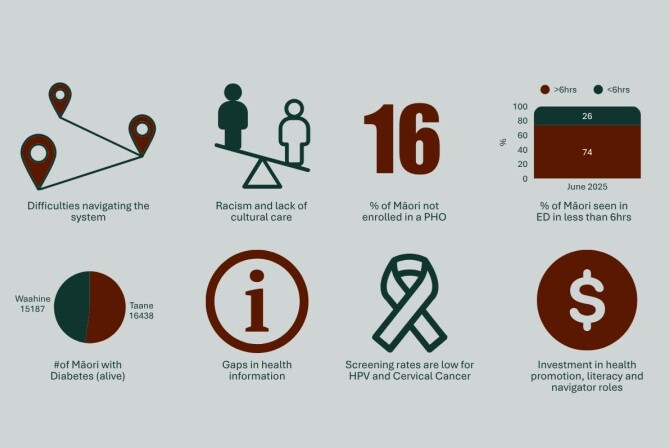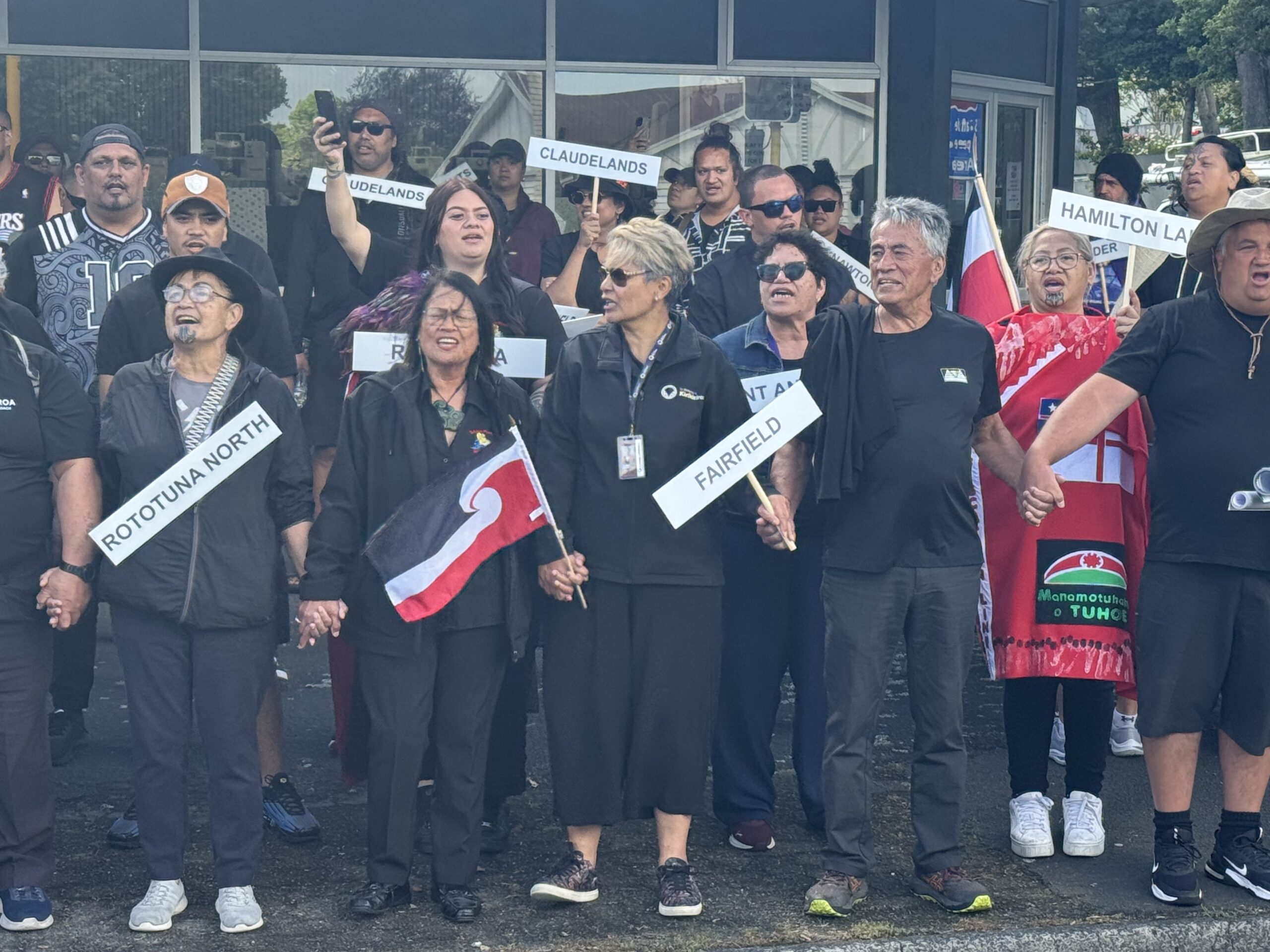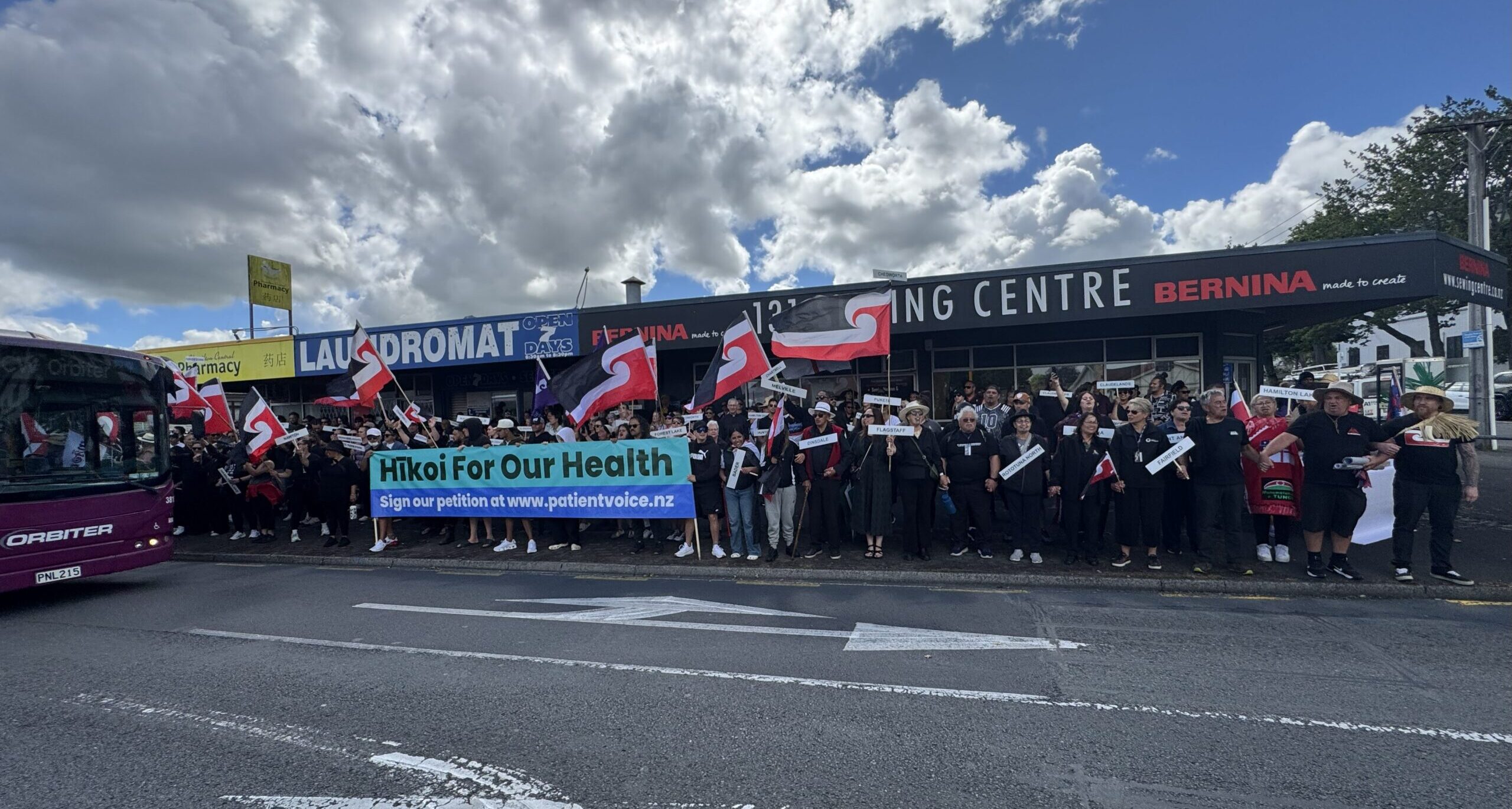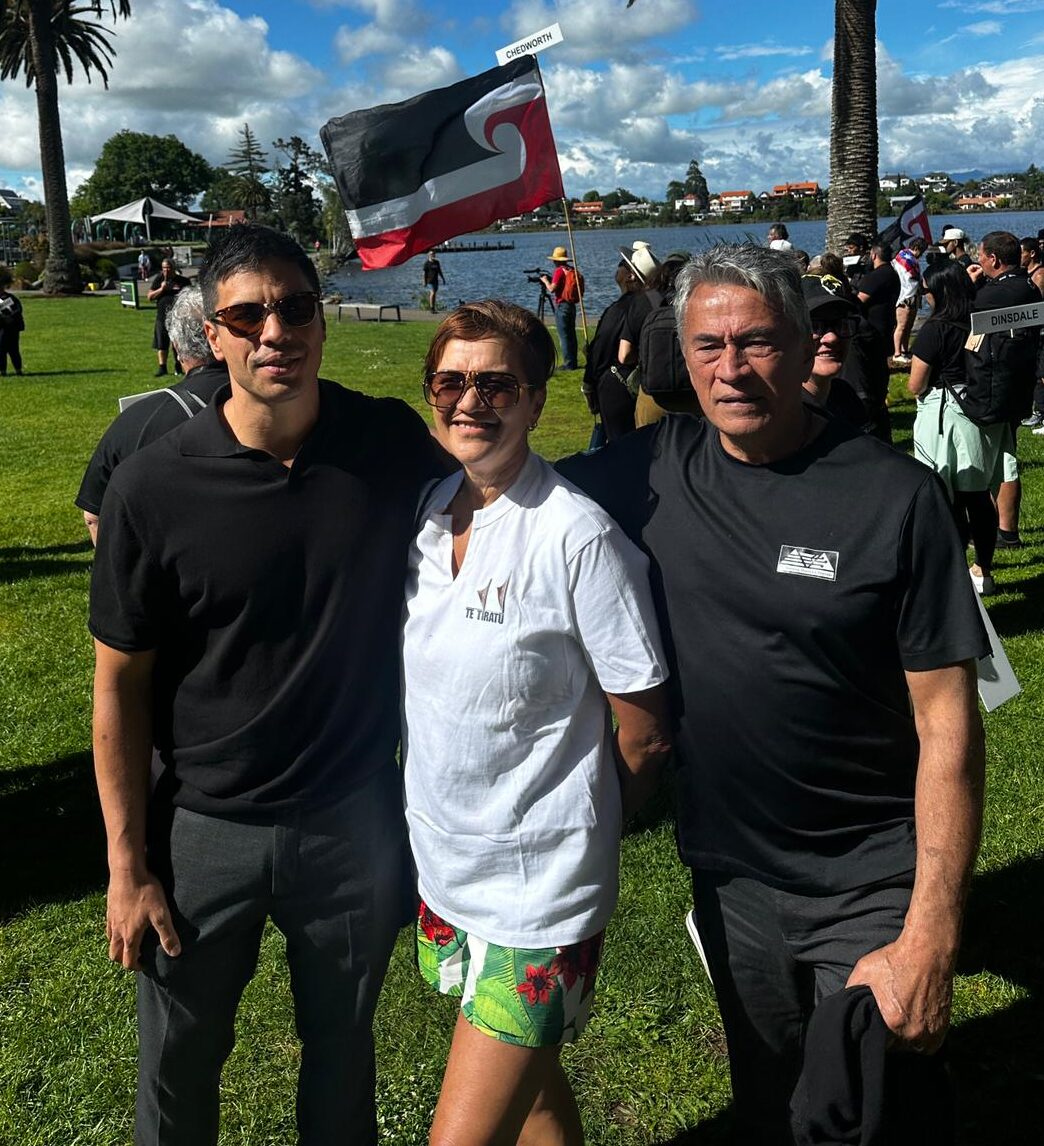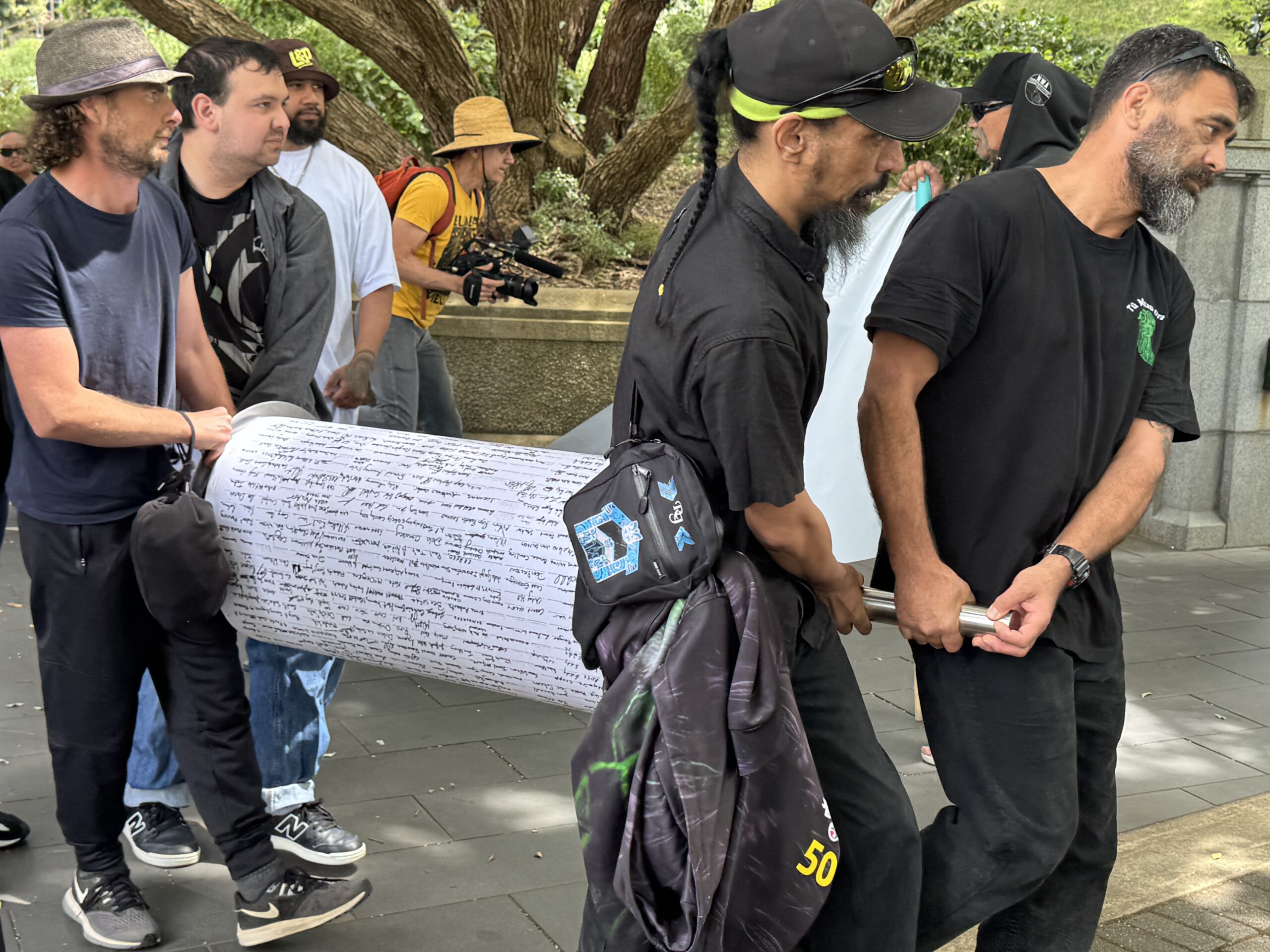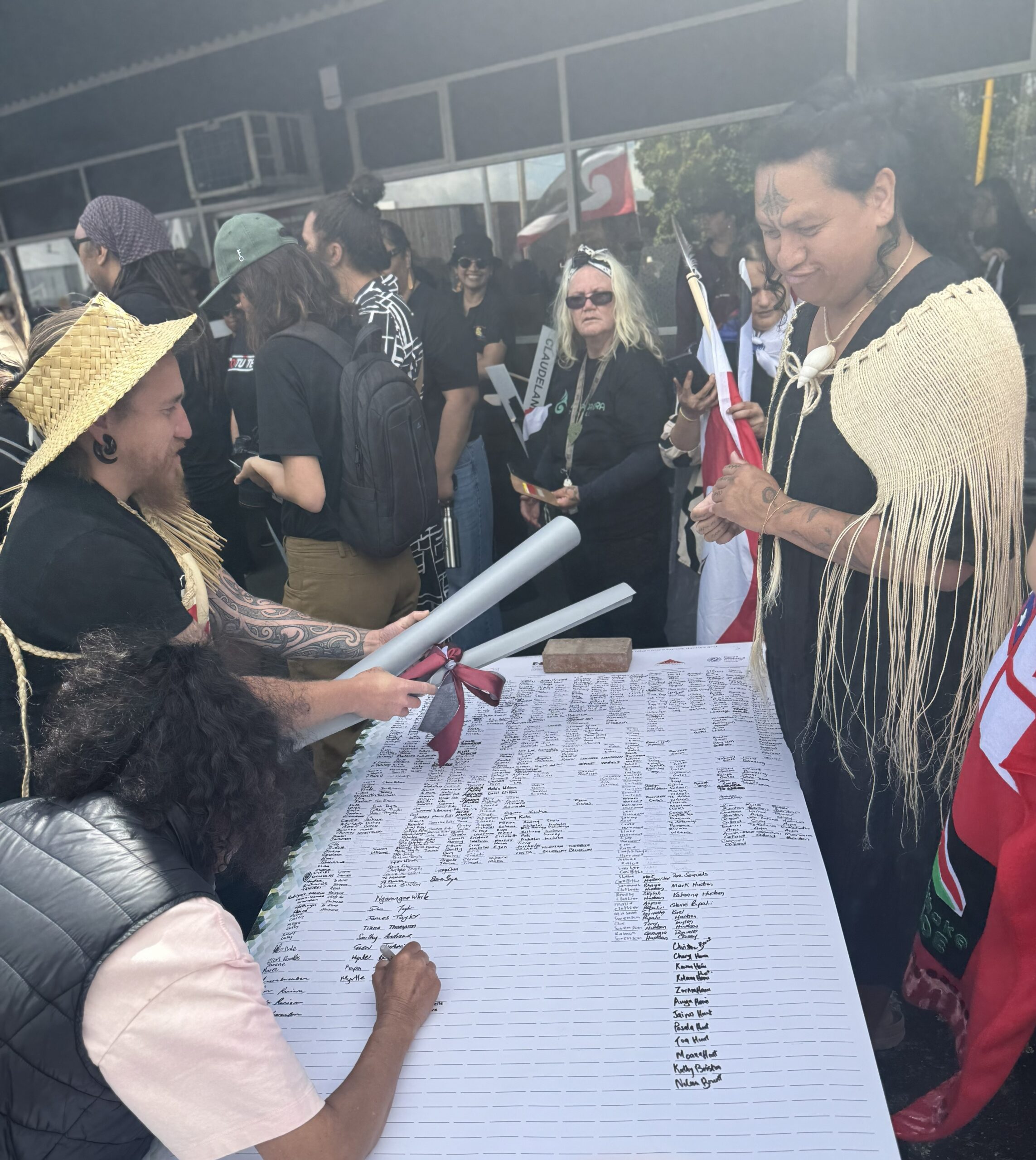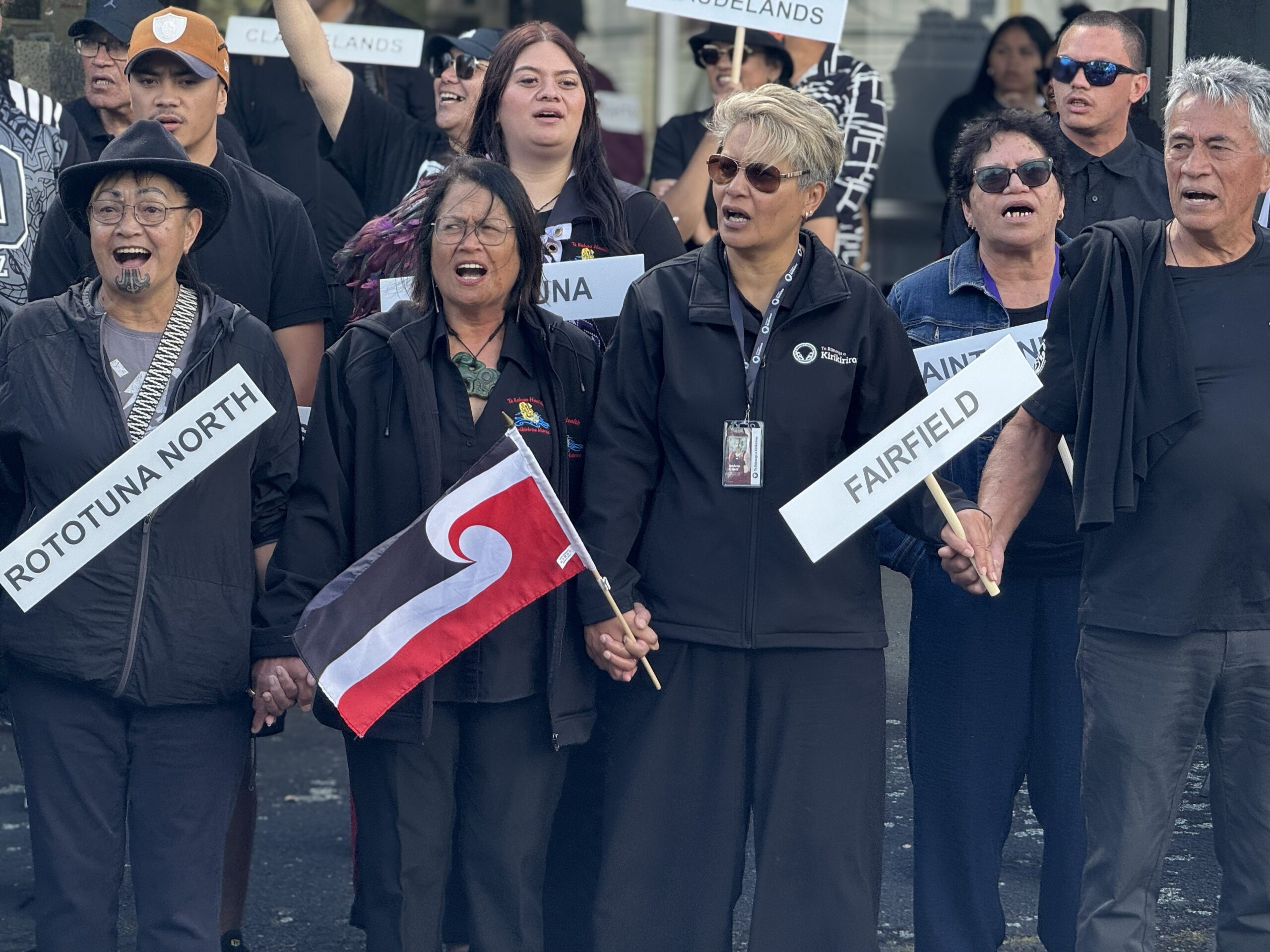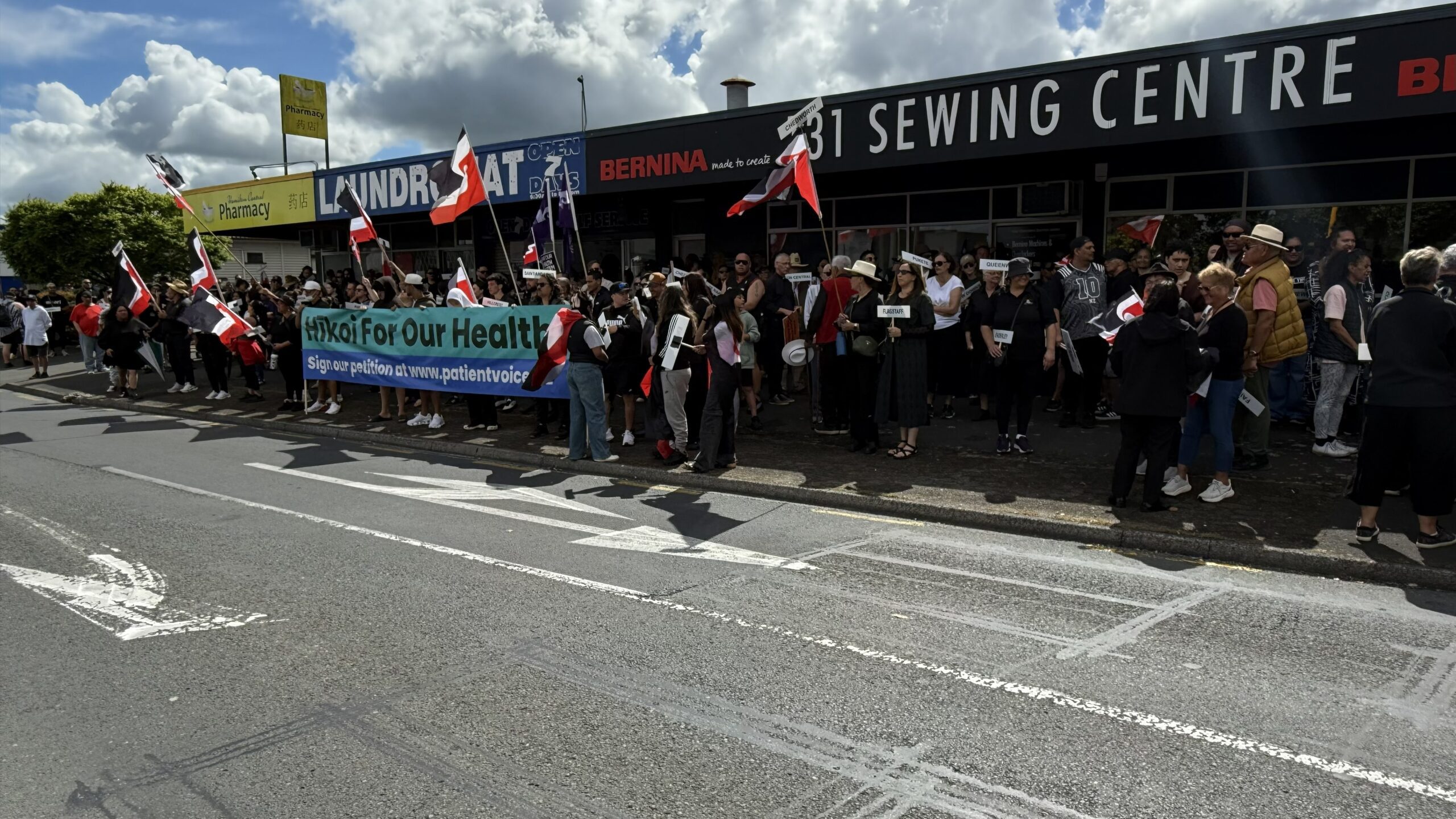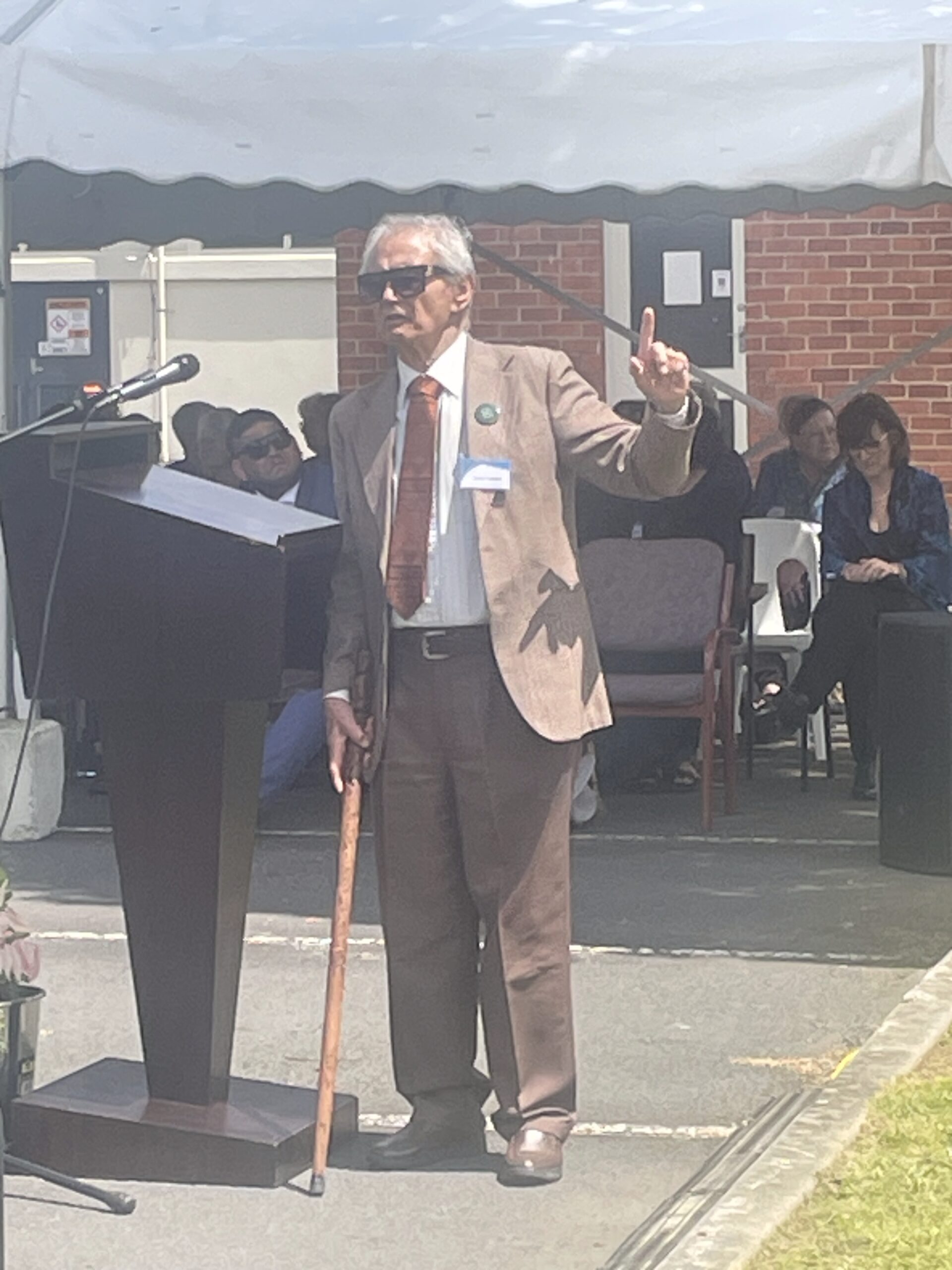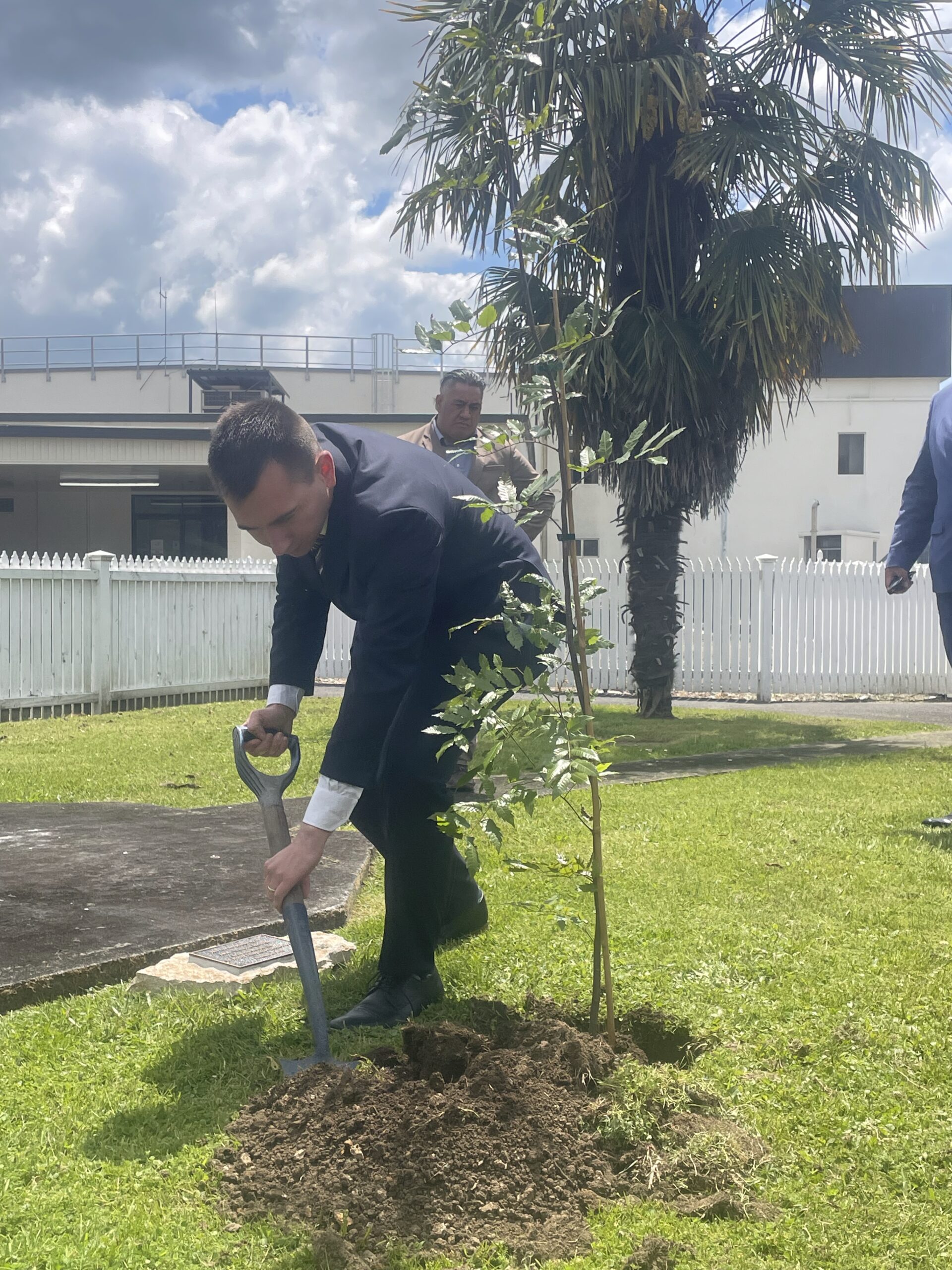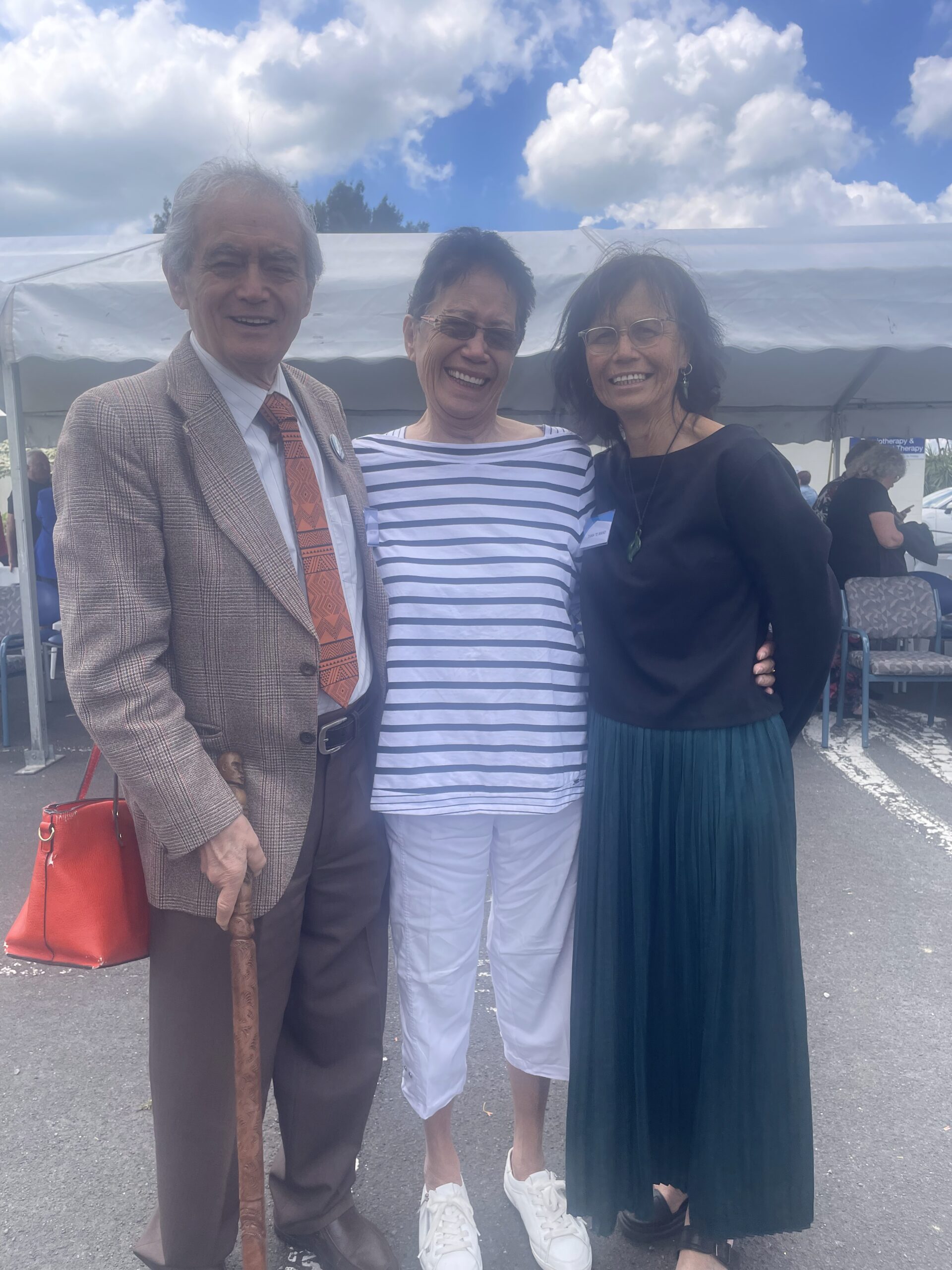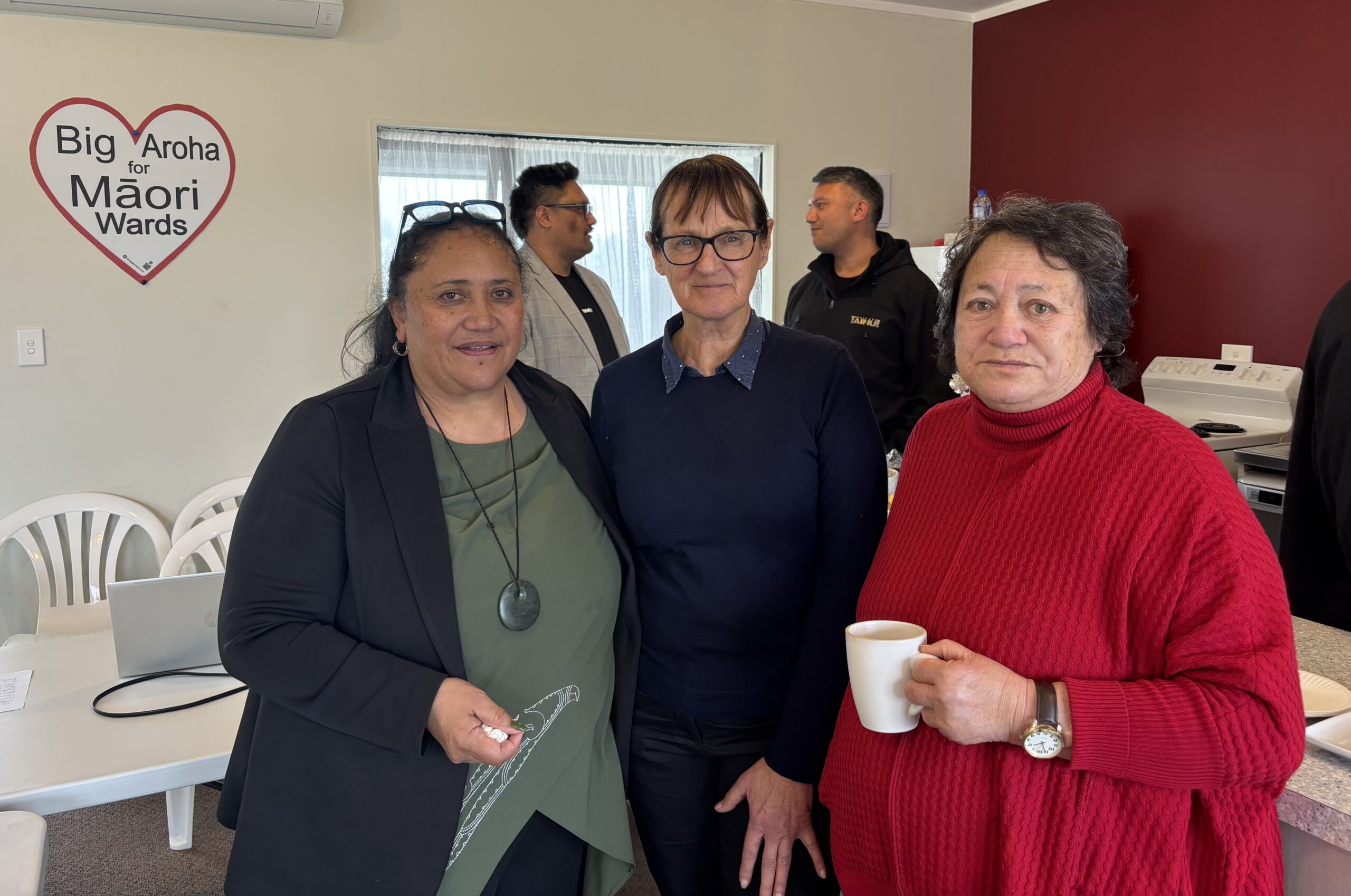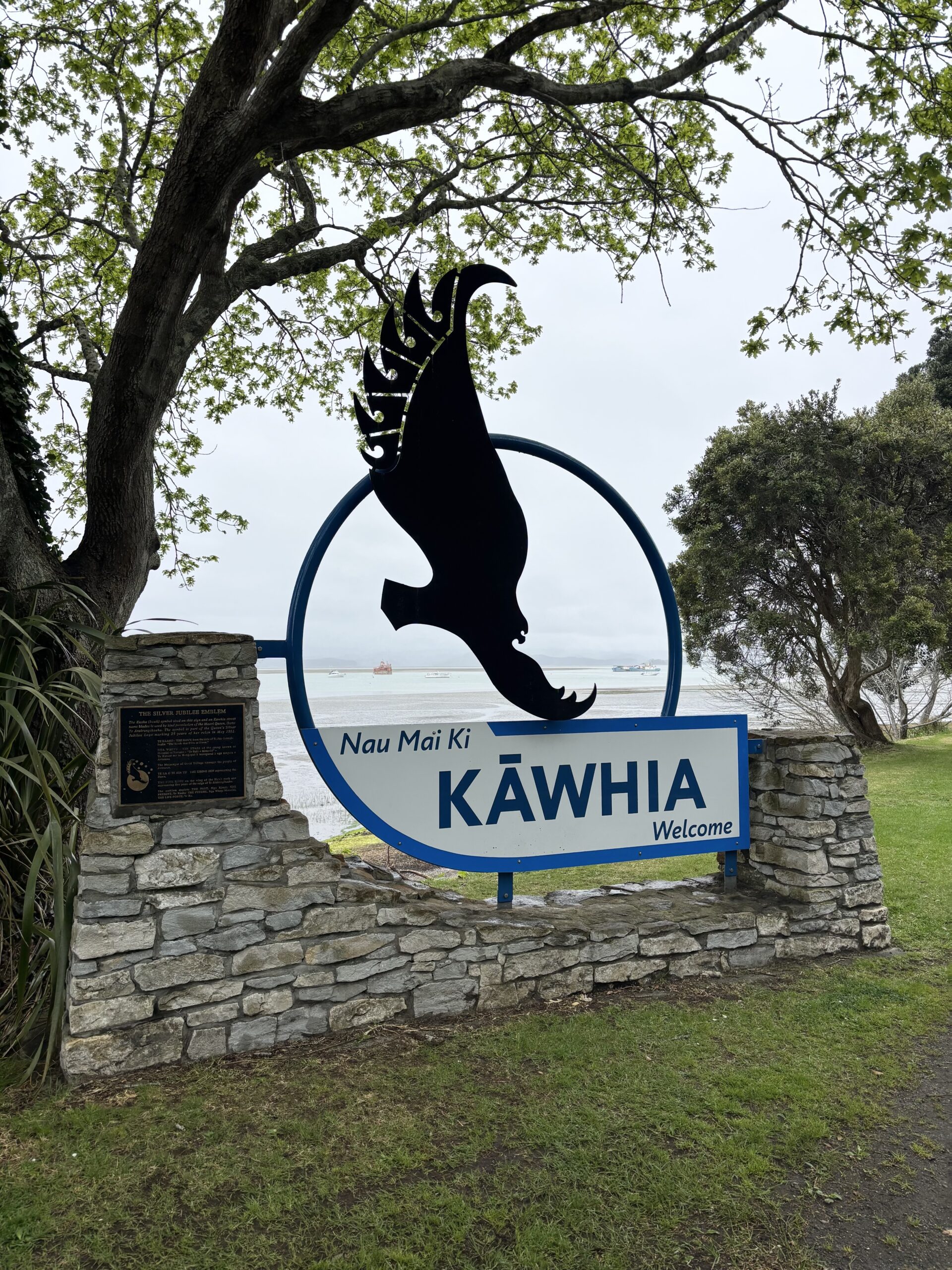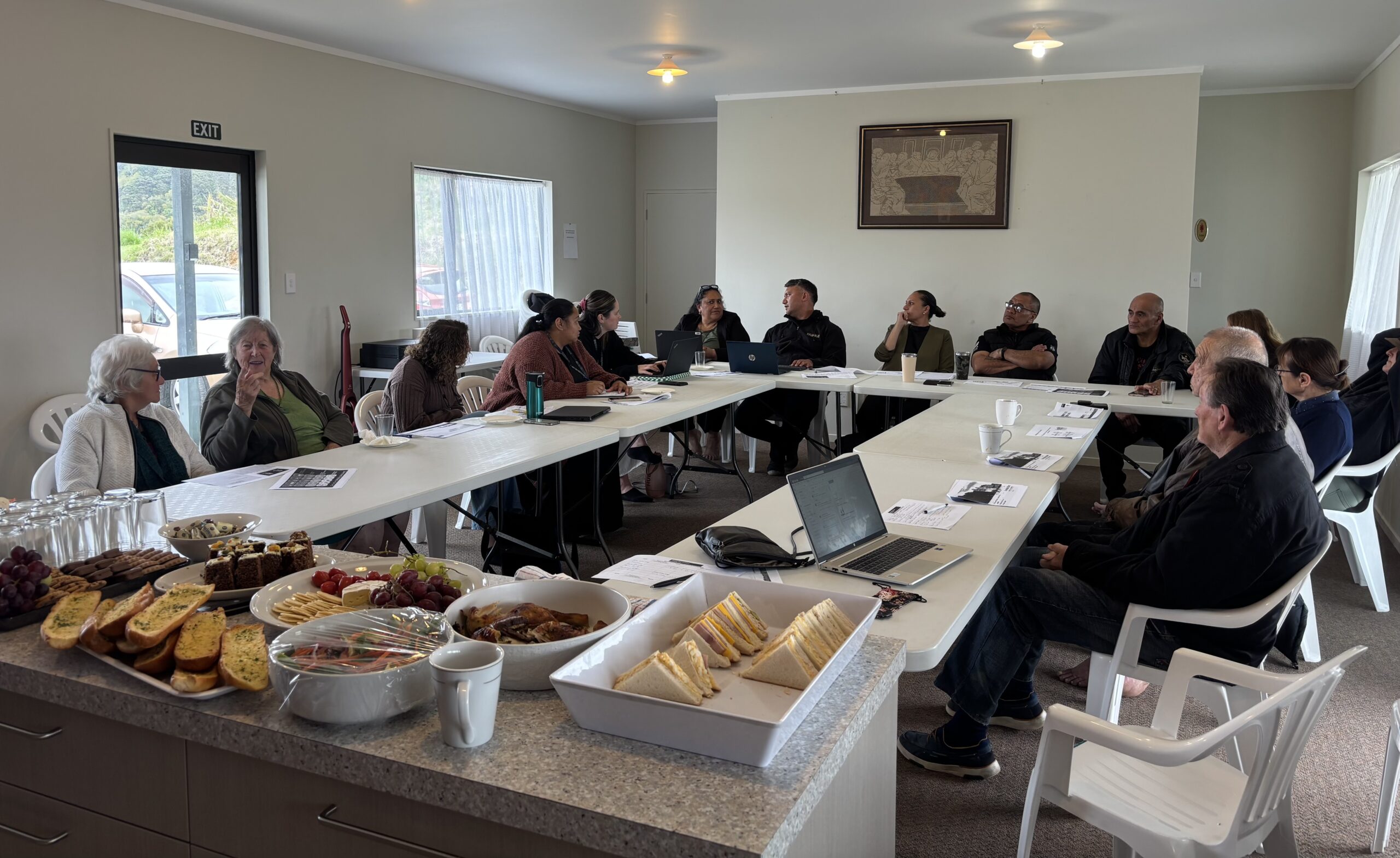Te Tiratū Iwi Māori Partnership Board member named new chair
Our Board member and clinician, Dr Mataroria Lyndon (MBChB, MPH, PhD), is the newly appointed Chair of the Whānau Ora Investment Board for the Upper North Island. He speaks to Waatea about the Board’s vital role in directing government resources to support whānau wellbeing. Under her leadership, the Board will continue to champion locally driven, culturally aligned initiatives that deliver sustainable, long-term outcomes for whānau across Aotearoa.
New chair of Whānau Ora investment board across Upper North Island
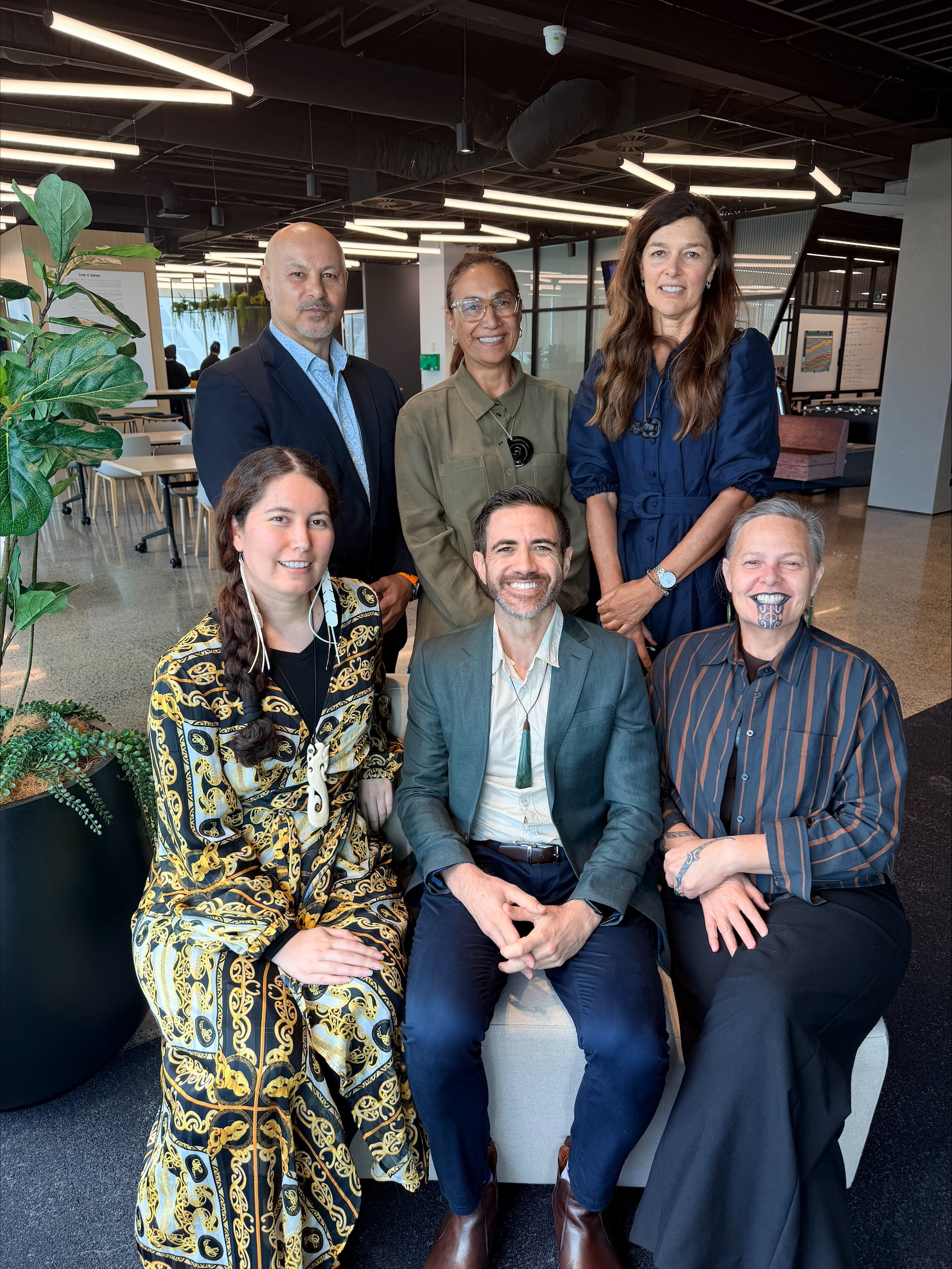
From left to right (Front): Ernestine Walsh, (Chair) Dr Mataroria Lyndon, Riana Manuel, (Back) Leon Wijohn, (CE) Te Rōpu Poa, Dr Leanne Te Karu.
Te Tiratū Iwi Māori Partnership Board warmly congratulates Dr Mataroria Lyndon, on his appointment as Chair of the Rangitāmiro Whānau Ora Commissioning Agency Investment Board in a region of 2.3 million across the upper North Island.
“Rangitāmōro reflects the collective strength and vision of Te Tiratū Iwi Māori Partnership Board, Ngā Pou Hauora o Tāmaki Makaurau, and the National Hauora Coalition (NHC) who are tripartite partners,” said Glen Tupuhi, co-chair of Te Tiratū Iwi Māori Partnership Board.
“The leadership under Mataroria alongside that of his fellow board members gives us confidence that Rangitāmiro will advance what matters most to our people. The oranga and mana motuhake of whānau living in Te Tai Tokerau to Tūwharetoa, including Tāmaki Makaurau, Waikato and Hauraki.”
This critical leadership role places Dr Lyndon at the centre of strategic investment and assurance for Whānau Ora commissioning in the largest Whānau Ora region of Aotearoa.
Rangitāmiro is one of four newly contracted agencies operating under the Government’s Whānau Ora commissioning model.
The Investment Board is a structural safeguard to provide independent investment advice on how to best distribute funding to meet regional need. It will provide data‑informed direction on priorities, needs analysis, workforce planning and allocative frameworks all designed to strengthen confidence in investment decisions and outcomes.
“What makes this Board particularly significant is the breadth of expertise it brings from across whānau wellbeing, economic development, Hauora, social investment, commercial governance and Mātauranga Māori,” Dr Lyndon said.
“We will provide advice that directly informs commissioning priorities, regional needs analysis and workforce planning – key inputs for disciplined, evidence‑grounded decision‑making.”
The Investment Board’s membership reflects deep regional representation and technical expertise, and includes:
- Dr Mataroria Lyndon, Chairperson (Ngāti Hine, Ngāti Wai, Ngāti Whātua, Waikato‑Tainui)
- Riana Manuel (Ngāti Pūkenga, Ngāti Maru, Ngāti Kahungunu, Ngāti Whanaunga)
- Leon Wijohn (Ngāpuhi, Te Rarawa, Ngāi Tūhoe, Ngāti Tahu‑Ngāti Whaoa)
- Dr Tristram Ingham, KSO, MNZM (Ngāti Kahungunu, Ngāti Porou)
- Ernestynne Walsh (Ngāti Porou,Te Whānau‑a‑Apanui)
- Dr Leanne Te Karu (Ngāti Rangi, Te Ati Haunui-a-Pāpārangi, Muaūpoko)
The Investment Board sets investment priorities that are informed by whānau aspirations and evidence and guides allocative frameworks across the region to maximise both impact and equit
The Board provides strategic advice on a wide range of planning and investment activities, including the three-year Regional Needs Analysis, Investment Plans, and Regional Workforce Plans, while monitoring impact and performance to ensure that public investment delivers real value for whānau and communities.
Rangitāmōro has already contracted 301 kaimahi, including 120 new roles, to meet growing needs across its rohe from Tuwharetoa to the Far North, supported by a Government‑signalled Whānau Ora funding envelope of up to NZ$66,552,000 million per year for region 1 in 2025/26 and beyond.
Dr Lyndon brings significant governance and commercial experience to the role across health, research and governance sectors. He serves on multiple boards, including Rangitāmiro, and Te Tira Tū Iwi Māori Partnership Board, co-founding Tend Health, lecturing at the University of Auckland, and advocating for cultural safety to improve health outcomes, holding degrees from Harvard and Auckland.
His leadership underscores the commitment of Rangitāmiro to rigorous investment planning and assurance processes, in line with TPK’s commissioning model and expectations of arm’s‑length independence.
Some gains, many gaps remain for Māori health - System monitoring report
MEDIA STATEMENT
FOR IMMEDIATE RELEASE
Wednesday 3 December 2025, 9:00 AM
2 minutes to Read

Te Tiratū Iwi Māori Partnership Board has released its latest Quarterly Monitoring Report, the second this year reviewing health system performance across the Tainui waka rohe in Waikato.
It builds on its inaugural report from June 2025 representing the interests of 121,000 whānau. While cervical screening rates have improved by 10%, ongoing inequities continue to affect whānau across the rohe.
“Since our first report, there have been small gains in areas like cancer treatment timeliness, but for too many whānau, the health system is still failing,” says Co-Chair Glen Tupuhi of one of the largest of the 15 Iwi Māori Partnership Boards established under the Pae Ora (Healthy Futures) Act.
“We are seeing Māori children fully immunised at just 60.8% far below the 95% target. Emergency department waits remain long, elective surgery delays continue, and access to primary care, especially in rural areas, is a major barrier.”
The report draws on lived experience from Whānau Voice surveys, limited Te Whatu Ora Health New Zealand data, and legislative benchmarks under the Pae Ora (Healthy Futures) Act 2022. Key findings include:
• Cancer treatment timeliness: 95.97% of Māori receive treatment within 31 days of diagnosis, slightly above the national target.
• Elective surgery: 31% of Māori wait more than four months for procedures.
“These numbers tell a clear story: inequity is entrenched and systemic barriers remain. Cost, distance, long wait times, and culturally unsafe services continue to harm whānau,” Tupuhi says.
The report also highlights ongoing gaps in Te Whatu Ora Health New Zealand’s reporting, governance, and partnership with iwi. Hauora Māori providers continue to deliver high-trust, culturally grounded services, but remain constrained by fragmented funding and siloed contracting.
Te Tiratū has shared the report with Te Whatu Ora and the Hauora Māori Advisory Committee, urging the findings to inform immediate action, investment, and policy reform.
“We’ve seen what’s possible when whānau are properly resourced and listened to,” Tupuhi says.
“Programs like Māori-led childhood immunisation show success, and now it’s time to scale that across all areas. Our goal remains a fair, accessible, and equitable health system one that honours Te Tiriti o Waitangi and the rights of our people.”
Background
Locality of Te Tiratū Iwi Māori Partnership Board represents the local Māori voice from:
1. Waikato – Central North Island, extending from the west coast (Raglan) inland to Hamilton and south towards Taupō.
2. Hauraki – Northern Waikato and the Coromandel Peninsula, bordering the Firth of Thames.
3. Maniapoto – Western-central North Island, covering the King Country, including Te Kūiti and Ōtorohanga.
4. Raukawa – South Waikato and central North Island, including Tokoroa, Putāruru, and Tirau.
5. Ngāti Hāua – Western-central North Island, around Taumarunui and the western Ruapehu district.
Pinnacle PHO & Te Tiratū strengthen partnership
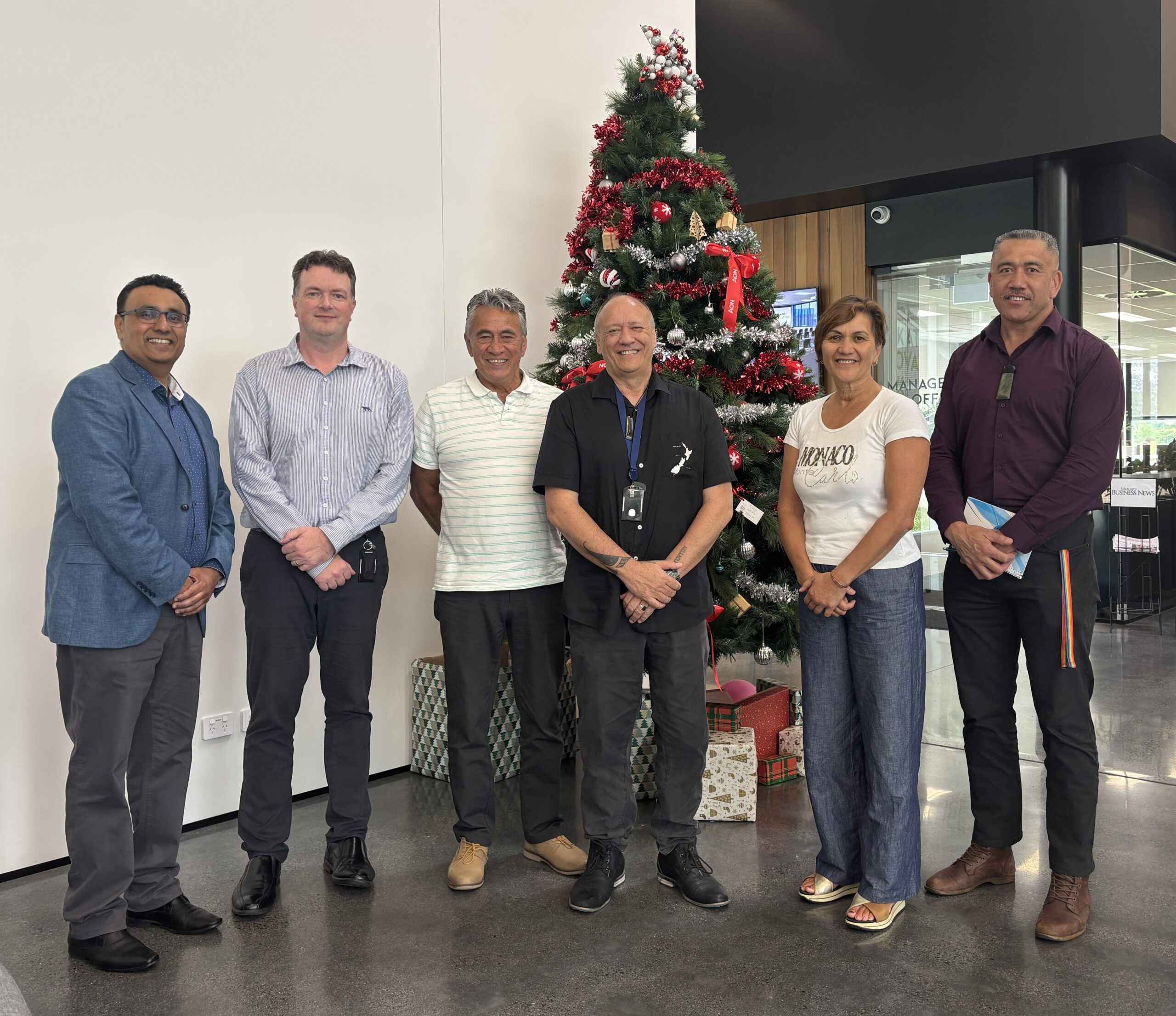
Photo: Amit Prasad, Justin Butcher, Glen Tupuhi co-chair Te Tiratū, Brandi Hudson Tumu Whakarae Te Tiratū and kaimahi Rawiri Blundell and Koro Samuels
With a shared commitment to improving Māori health, Te Tiratū Co-Chair and Tumu Whakarae met with Pinnacle Primary Health Organisation leaders Amit Prasad, Justin Butcher, and kaimahi Rawiri Blundell and Koro Samuels to strengthen collaboration on primary care in Waikato.
The kōrero emphasised the importance of all PHOs and Te Whatu Ora working together, particularly by aligning how health data is collected and reported, so decisions are based on accurate, timely information that truly reflects Māori communities at both regional and local levels.
Pinnacle PHO supported our Position Statements and concerns about vaping and its long-term impact on rangatahi and whānau, the critical role of school nurses in proactive healthcare, and the particular challenges faced by rural communities.
There was unanimous agreement that the high number of unenrolled Māori, and those enrolled but not receiving regular health checks or screenings, is an urgent issue that must be addressed collaboratively.
The discussion also highlighted shared pressures in the primary care workforce and the need for sustainable funding solutions. Expanding nurse-led models of care, including mobile services and workplace health checks, was seen as a practical way to reach Māori men and whānau, help address GP shortages, and reduce wait times for appointments.
Strengthening the link between primary care and specialist services was recognised as essential for managing long-term conditions such as cardiovascular disease, diabetes, respiratory illness, mental health, and gout, particularly improving access to prescribed medications. Greater use of Nurse Prescribers was identified as a key way to tackle this pressing equity challenge.
Both organisations acknowledged the importance of supporting whānau to navigate modifiable behaviours, including nutrition, exercise, alcohol use, smoking, and vaping, while ensuring health education resonates with young Māori.
They also recognised that many whānau cannot afford expensive healthy food options, and that solutions must be practical, affordable, and grounded in the lived experience of Māori communities. Lifting immunisation rates remains a shared priority, with a clear focus on closing Māori equity gaps before broader population initiatives.
To maintain momentum and deepen the partnership, a Board-to-Board hui will be scheduled in the New Year. This meeting will advance collaborative work on health data, strengthen advocacy, and guide future investment and planning to achieve better health outcomes for Māori across the Waikato.
Te Tiratū takes to the streets in Hīkoi for our Health
Several Te Tiratū board members with our senior executive walked in solidarity with hundreds of whānau in the Hamilton leg of the nationwide Hīkoi for Our Health, that’s calling for urgent government action to fix Aotearoa’s failing health system.
The march, led locally by Lady Tureiti Moxon, Managing Director of Te Kōhao Health, departed from Hamilton Lake Playground to Waikato Hospital carrying the Buller Declaration on the State of the New Zealand Health System, now signed by more than 95,000 people.
Our Co-chair Glen Tupuhi, reflected on the responsibility of older generations in protecting the health system.
“It’s very important when we look around and see the rangatahi, and also the baby boomers. It is us that are breaking down. It is us that are putting pressure on the health system, and it is us that really need to fight for the retention of services and not allow this creeping privatisation,” he said.
“Exposing health to free market forces is not going to be good for us, our children, or our tamariki. Our tupuna fought to build the welfare state, and we have inherited that. It’s up to us to ensure it is handed on to the next generation.”
Brandi Hudson, our Tumu Whakarae had a similar stance, “We are here because we want to celebrate the fact that Māori are leading the way with advocacy for better health services for our whānau. We thank Lady Tureiti Moxon today for working alongside the whānau or Kirikiriroa to highlight how the resources for Māori health are failing.”
The focus for Lady Tureiti Moxon is partnership and structural change.
“Te Tiriti o Waitangi is a blueprint for partnership and accountability. When the Crown makes decisions about Māori health without Māori, that is not partnership. We need structural change. This hīkoi is about calling the Government to honour Te Tiriti and build a system designed with, by, and for our people. We walk not just for ourselves, but for our tamariki and mokopuna. For our hauora. For our future,” she said.
Malcolm Mulholland, Chair of Patient Voice Aotearoa and the national organiser, said the hīkoi sends a clear message across the country.
“New Zealanders are united in saying our health system is in crisis. We walk for those behind the statistics, those waiting in corridors, those turned away, and the health workers holding the system together. This hīkoi is our call to those in power: fix it now, before more lives are lost.”
The month-long hīkoi, which began in Westport on 1 November, retraces the path of the original Buller march that sparked this national movement.
It will reach Parliament in Pōneke on Tuesday 18 November, where thousands are expected to gather to deliver the signed Declaration to Members of Parliament. Today in Kirikiriroa, the message was one of unity, mana motuhake, and hope for a health system that values people over bureaucracy and equity over excuses.
Hauora Day brings Cambridge whānau together
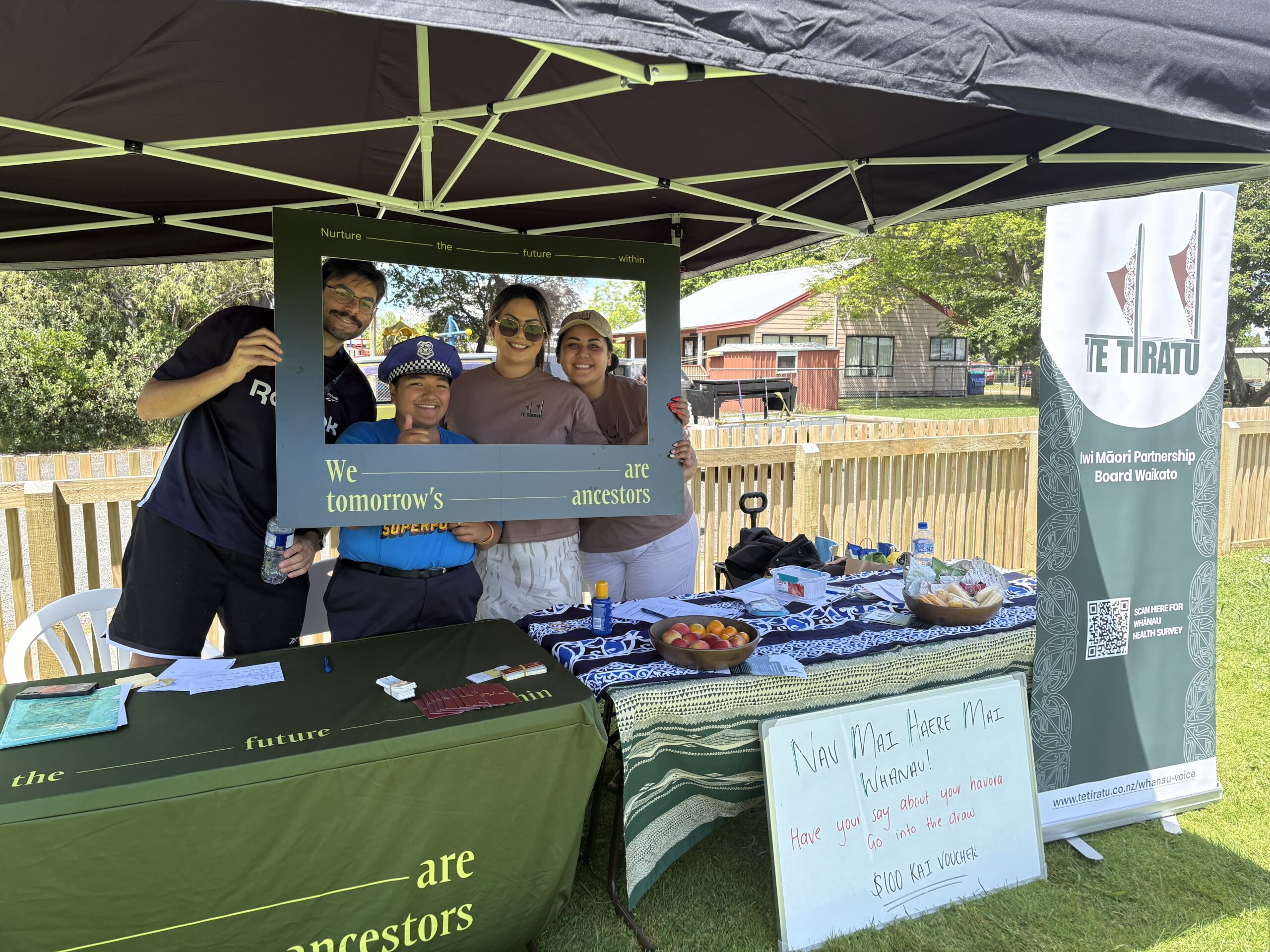
As the sunshine lit up Cambridge Community Marae, Ngāti Koroki Kahukura welcomed whānau, health providers, and our Whānau Voice kaimahi from Te Tiratū to celebrate Hauora Day.
It was a vibrant gathering of kōrero, connection, and community spirit. Organised by Norma Taute who we applaud as she has championed Hapu Hauora amongst Ngāti Koroki Kahukura. The event brought together Māori and non-Māori providers alongside whānau of all ages, creating a safe space to share stories, explore health services, and highlight both the strengths and gaps in care.
Providers shared insights into the needs of whānau, from understanding the difference between occupational and sports injuries versus age-related conditions with ACC, to the importance of alcohol and other drug support in and out of prison.
The kōrero revealed gaps in primary mental health care, challenges accessing cervical screening despite self-testing kits, and the ongoing need for hearing checks and oral health support for tamariki. Traditional rongoā practitioners, St John’s Ambulance, and suicide prevention teams were also part of the kaupapa on the day.
Whānau also shared their experiences, celebrating excellent hospital support while caring for loved ones, and highlighting disruptions when long-standing doctors retire. Across the 16 surveys completed on the day, whānau spoke of long GP and specialist wait times, the rising cost of healthcare, transport challenges, and the need for kaupapa Māori and holistic health services closer to home.
Activities that support wellbeing including whānau time, cultural connection, marae participation, and physical activity were identified as central to hauora. Almost all whānau who participated felt that government health and mental health targets do not meet their needs, reinforcing the importance of listening to whānau voices.
We gathered kōrero and ensured whānau perspectives were amplified alongside providers, making the day as much about listening as it was about sharing. On stage, Hauora providers showcased their services, a raffle was drawn as we all enjoyed a delicious, shared hangi.
Despite other events like waka ama taking place on the same day, Hauora Day was a clear testament to the commitment of Ngāti Koroki Kahukura to whānau wellbeing. It showed that whānau people come together to kōrero, share knowledge, and celebrate collective care, it strengthens not only their individual health journeys but the health of the whole hapori.
Te Awamutu Gala celebrates Hato Hone St John & hauora
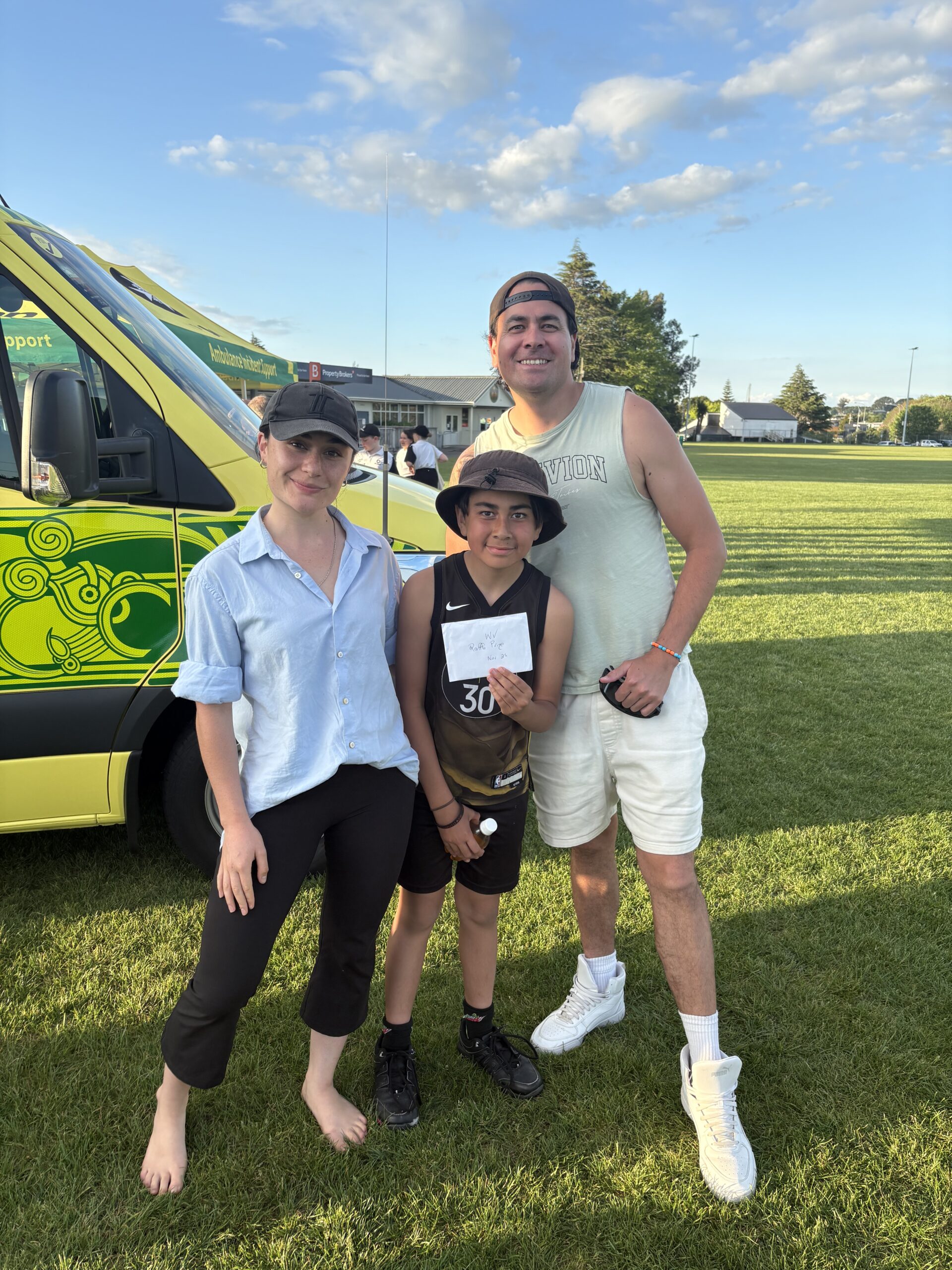
Te Tiratū was proud to attend Te Awamutu’s annual Community Gala at Albert Park, held in support of Hato Hone St John and their ongoing commitment to our community. The gala brought together locals, visitors, businesses, supporters, and volunteers for an evening of celebration, connection, and entertainment.
This year’s 2025 gala highlighted the incredible mahi of Hato Hone St John on the frontline of medical response and ambulance care in the district, mahi tika ana ngā kaimahi o St John! Te Tiratū acknowledges and celebrates their dedication and tireless work.
The event also provided a space for whānau to share kōrero about health care in Te Awamutu and rural communities. While celebrating available services, attendees spoke openly about the challenges they face in accessing comprehensive hauora support, including high costs, difficulty securing appointments, and care that doesn’t always reflect their unique cultural needs. Some whānau admitted they often avoid check-ups altogether.
A representative from St John, who works in the Emergency Department, shared how these access barriers affect frontline care and highlighted the importance of improving primary care for rural communities. We heard about Kaumātua experiences and the positive impact of Mangatoatoa Health Clinic at Mangatoatoa Marae, noting the critical support provided by Pinnacle and Waikato iwi resources.
The gala also reflected the strong community networks and partnerships supporting hauora across the district. Neighbourhood Watch shared concerns about youth vaping, nangs, meth use, and alcohol, while also noting positive changes such as Kihikihi’s earlier bottle store closing.
Our hardworking Hauora providers emphasised the importance of access for remote and rural whānau and highlighted successful community-led responses, including initiatives from Arahina. The Māori Women’s Welfare League Tainui Branch shared their health programmes delivered in Kihikihi, supporting whānau engagement in wellbeing activities.
Organised by Te Awamutu Sports, Ko Wai Au, and other local groups, the gala was a hugely unifying annual event celebrating the generosity, care, and resilience of whānau and community. Through the kōrero shared at the gala, Te Tiratū reinforces the importance of accessible, culturally responsive health care and the ongoing collaboration needed to ensure whānau in Te Awamutu and surrounding rural areas are supported in their hauora journey.
Te Kūiti Hospital Centenary: Honouring a Taonga of the King Country
From left to right: Kaumātua Ngāti Rora, Kingi Turner, Health Minister Hon. Simeon Brown planting a rākau, Kingi Turner with Lynne Stafford and Charge nurse Tania Te Wano
Te Kūiti Hospital, a treasured taonga of the King Country, has been honoured for 100 years of service to the community.
We were there at the centenary celebration in the weekend at the hospital grounds hosted by Ngāti Rora, brought together staff, whānau to reflect on the hospital’s enduring connection to tangata whenua and the whenua it stands upon.
Ngāti Rora paid tribute to the legacy of those who built and sustained the hospital, from its official opening by Sir Māui Pōmare in 1925 to the dedicated teams who continue to care for the people of the region today.
The hospital sits on land gifted by Rangatira Tanirau Hetet, whose uri attended the centenary to honour the contribution of their tūpuna. Generous support from Tanirau Hetet, who donated 3.5 acres of land, laid the foundation for an enduring partnership between Māori and the Crown to deliver vital health services across the King Country.
For generations, Te Kūiti Hospital has been a lifeline for our whānau, providing emergency, maternity, surgical, and community services across the rohe. Feedback gathered through our Whānau Voice shows that whānau want health care to remain close to home.
Many say that local access to care allows them to stay connected to whānau and whenua, rather than face long and costly travel to Waikato Hospital. A bus service introduced 30 years ago between Taumarunui and Waikato Hospital continues to support whānau who must travel for specialist appointments, a reflection of how community-led solutions have long underpinned rural health care in the region.
For charge nurse Tania Te Wano, who has served Te Kūiti Hospital for three decades, the centenary was deeply personal. Community tributes shared on the Legendary Te Kūiti Facebook page described the hospital’s legacy as one that has produced “iconic surgeons and doctors, medical advancements, births of legends, helicopter transfers, and pandemic responses.”
Health Minister Simeon Brown attended the celebration acknowledging Te Kūiti Hospital as a symbol of perseverance and partnership. He planted a commemorative tree to mark the milestone and recognised the hospital’s ongoing role as one of six rural prototype sites trialling improvements to local health services, including better access to diagnostics, on-call pharmacy support, and digital tools for clinicians.
Te Whatu Ora rural manager Rachel Swain said workforce shortages and aging infrastructure remain challenges for rural hospitals. She highlighted the government’s Rural Health Strategy, which prioritises keeping services close to home, strengthening prevention, and supporting a flexible rural health workforce. Investments in regional training hubs and the new Waikato Medical School aim to grow the next generation of doctors and nurses from within rural communities.
One hundred years on, Te Kūiti Hospital remains more than a place of healing. It stands as a taonga, a testament to partnership between whānau, mana whenua, and health services and a reminder of what can be achieved when care is grounded in place, people, and whakapapa.
Skin health kōrero at kura draws many in Rāhui Pōkeka
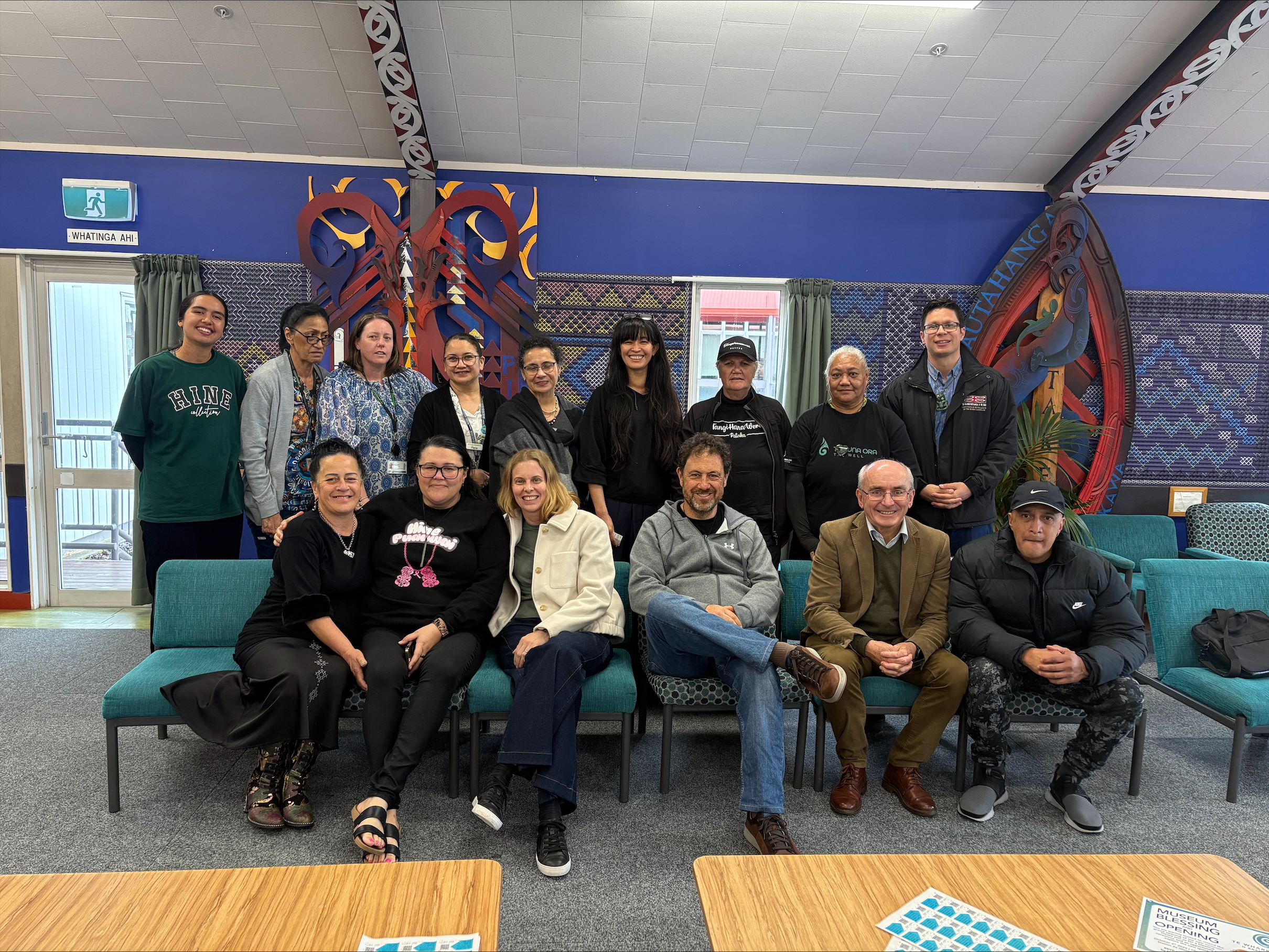
Our Whānau Voice kaimahi attended a community hui at Te Wharekura o Rakaumanga, hosted by Matawhaanui Trust to kōrero about common health challenges affecting tamariki and whānau, with a special focus on skin conditions.
It was a packed and uplifting session, bringing together whānau, nurses, paediatricians, rongoā practitioners and other health professionals who shared their knowledge and practical advice. Among those present were Nurse Practitioner Justina Leaf, CEO of Matawhaanui Trust Joyce Maipi and her whānau, Julia from Sexual Health Waikato, and three paediatricians from the ARROW childhood wheeze trial, Dr Cameron Bennett, Dr Owen Sinclair, and Dr Te Aro Moxon.
The kōrero centred on simple, practical ways to support whānau managing skin issues like eczema and scabies. Dr Owen Sinclair reminded those gathered not to be too hard on themselves, saying the problem is the eczema, not the child. He emphasised that mindset matters, and that parents should not feel blame but instead focus on gentle, consistent care.
Dr Cameron Bennett spoke about the importance of rest, as sleep gives the body time to fight infection, and also shared tips around salt baths, soaked dressings, and managing infections that can complicate skin conditions. Others suggested checking whether soaps or food such as cow’s milk might be contributing to irritation.
For some whānau, cost can be a barrier, and affordable options like adding a teaspoon of Janola to the bath were discussed as simple ways to disinfect the skin when used safely. Parents were also encouraged to make sure that kōhanga or preschools are aware if tamariki have hot or red skin, so early help can be found.
Dr Te Aro Moxon, who works both as a community paediatrician and general physician, spoke about the need to strengthen the link between hospital-based care and the support available in communities. The hui also highlighted the barriers that many whānau face in accessing healthcare, from the cost of travel to Hamilton, to issues of trust, affordability, and feeling heard.
Joyce Maipi, shared a heartfelt story about a young wahine from the community who passed away at just 38 years old from breast cancer that was detected too late. She spoke of her legacy as a reminder to all wāhine to get screened early, noting that the Breast Screening Aotearoa mobile unit is currently parked outside Huntly Woolworths.
Justina Leaf acknowledged that this was the first face-to-face forum held in some time and thanked those who travelled down from Auckland to attend. She shared examples of the manaaki shown by Matawhaanui’s team, from staying on late to help a koro with heart issues, to supporting another with nicotine patches that helped him give up smoking and improve his health. These small but powerful acts of care, she said, are what make the difference for whānau.
Rongoā healers from Te Puna Ora also attended, sharing their mirimiri and natural health knowledge. Julia from Sexual Health Services (formerly Family Planning) spoke about the importance of HPV vaccination and the rising rates of syphilis, encouraging whānau to get checked and treated, especially for the health of unborn pēpi. Rangatahi were also present including nieces and nephews brought along by their aunties and uncles and their participation was warmly acknowledged as a positive sign of intergenerational learning in action.
The hui ended with Ursula from the Electoral Commission encouraging everyone to make their voices count in the upcoming election. For whānau wanting trusted information and support, the KidsHealth website was recommended as a valuable resource for parents, alongside the ARROW study site and the Paediatric Society’s equity commitment page.
It was a powerful and timely reminder that hauora begins at home with aroha, rest, and simple, practical care. By bringing together community voices, health professionals and researchers, gatherings like this help bridge the space between hospitals and homes, between science and rongoā, and between whānau and wellbeing.
Kāwhia whānau lead kōrero on more support
This morning in Kāwhia, a close-knit community of just 378 people, we joined the latest Community Health Forum to kōrero, listen, and offer tautoko. Te Tiratū acknowledges the vital work of Te Whatu Ora kaimahi, who coordinate these hui across the rohe to connect with whānau, share updates, and ensure their voices are heard.
Whānau travelled from across the West Coast Harbours to share their stories, experiences, and priorities for the wellbeing of their whānau and community.
A key priority was funding awareness and support. Whānau highlighted the need for proactive guidance from Te Whatu Ora staff to help them understand and access available funding opportunities. Clear advice, they said, empowers whānau to improve wellbeing, build resilience, and strengthen independence.
Another strong theme was community connection. Whānau spoke about the importance of small, humble events, from karaoke nights to kaumatua creative workshops, which lift spirits and reduce isolation, especially for those living alone.
The forum also highlighted kaumātua support needs. Many kaumātua are struggling with everyday tasks and require consistent, daily support. Whānau spoke about the need for a kaumatua bus, tailored services, and culturally appropriate care to help uphold their dignity and independence.
Transport challenges were another key concern. Funding and reliable transport to Waikato Hospital and nearby towns remain a significant barrier, especially for those requiring regular appointments, specialist care, or after-hours help.
Accessing home help is difficult in isolated areas. Limited carer training and high travel costs make services unaffordable for many whānau. Investment in workforce development and travel support is urgently needed to ensure everyone receives the care they need.
Rangatahi mental health was a serious topic of discussion. Suicide among rangatahi is a concern in isolated communities. Whānau want more clinical expertise, suicide prevention support, and culturally responsive mental health services available close to home.
Primary care workforce shortages were raised as a pressing issue. Dr John Burton, the local GP, has been a lifeline for Kāwhia whānau, but there is uncertainty about future care provision once he retires. Succession planning and investment in rural healthcare are critical to maintaining services.
Whānau also spoke about the need for Disability Allowance awareness. Clear communication and outreach regarding support available through WINZ and ACC will ensure that entitlements are accessed and whānau can receive the help they need.
After-hours care is available through Ka Ora Telecare and 24/7 telehealth services, but these user-pays services can be costly for those without a Community Service Card. Affordable options are needed to ensure whānau can access care at any time.
Public health preparedness was another focus. The Waikato Immunisation and Public Health Teams are coordinating plans in case of measles or other outbreaks. Community awareness and readiness are key to keeping whānau safe.
Finally, whānau highlighted the urgent need for affordable dental services for adults in rural areas, to ensure everyone has access to essential care.
It was clear that the Health Forum shone a light on the power of connection. It reminded everyone that strong kōrero, listening, and care can make a real difference in whānau wellbeing.
